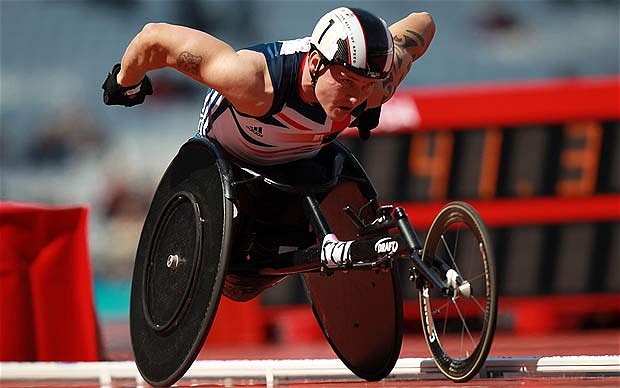
Richard: London 2012 refers not only to the Olympic Games but also to the Paralympic Games. So for this week's podcastsinenglish.com we're talking about the Paralympics. So Jackie, when did they start?
Jackie: Mmm, it's interesting nowadays we always think of the Olympics and the Paralympics going hand in hand but it wasn't always the case. It started back in 1948. Interestingly, that was when the Olympic Games was in London as well. And it was started um... of course 1948 is just after the Second World War, and it was started as an opportunity for the World War Two veterans, the soldiers, to take part because a lot of those had been disabled during the war.
Richard: So originally the Paralympics was only for um... World War Two service veterans?
Jackie: Servicemen. And it wasn't until 1960 that it was opened up to all people with disabilities.
Richard: Did it start pretty small?
Jackie: Yes. But in fact of course, Richard, it's still much smaller than the... the general Olympics.
Richard: So the Paralympics is only for disabled people, yes?
Jackie: Well actually, Richard, fully able people can participate in the Paralympic Games.
Richard: Oh. Which events are they in, then?
Jackie: Well um... athletes with visual impairment...
Richard: Blind people.
Jackie: ...or partially blind.
Richard: Right
Jackie: ...in some of the sports, in some of the events, they can have a sighted guide.
Richard: Ah right okay, so which ones are those you're talking about?
Jackie: For the Summer Olympics it includes things like cycling.
Richard: Cycling. How... how... how does that work?
Jackie: Well, for example this is when they have um... the tandem bicycle. So the able-bodied rider is on the front seat...
Richard: Right
Jackie: ...and the... and the visually impaired cyclist is on the back seat.
Richard: Good idea but obviously you want to get a top cyclist sitting up front for you, don't you?
Jackie: Well, they're considered a team and what is interesting both of them can win medals.
Richard: Fantastic, I think that's a good idea. So the tandem is only in the Paralympics, I'm pretty sure, but are there any total sports that are only in the Paralympics not in the regular Olympics?
Jackie: There are three sports. One of those is called Bocaccia*. Have you heard of that?
Richard: Bocaccia? It's not an Italian bread that's for sure.
Jackie: It's an Italian name but basically it's... it's a ball-throwing event and the participant has to be in a wheelchair.
Richard: Right, okay I'll look into that, sounds interesting. Right, so you've mentioned that there are some able-bodied athletes in the Paralympics. Now I believe also, there is at least one Paralympian in the regular Olympics, isn't there?
Jackie: Yes. A South African runner is going to participate in the 400 metres and the 4 x 400 metres relay.
Richard: The relay as well?
Jackie: Yeah
Richard: The Blade Runner.
Jackie: And why is he called the Blade Runner?
Richard: Because that's what he uses on his legs.
Jackie: Yes. He's, he's a double amputee, no... no... no legs below the knee.
Richard: Right
Jackie: And he's got these special blades.
Richard: Very controversial.
Jackie: It is rather controversial because some people claim that it actually gives him more of an advantage.
Richard: Yes
Jackie: Yeah, but he has a very nice sporting motto, Richard.
Richard: Oh really? And what's that?
Jackie: He says, “You're not disabled by the disabilities you have, you are abled by the abilities you have.”
Richard: Well said.
* Jackie made a mistake: it's not Bocaccia, it's Boccia!